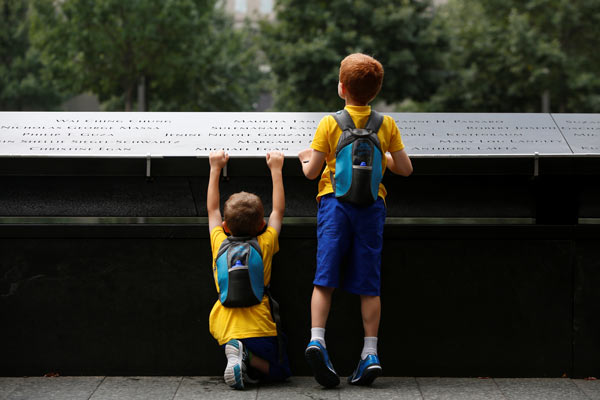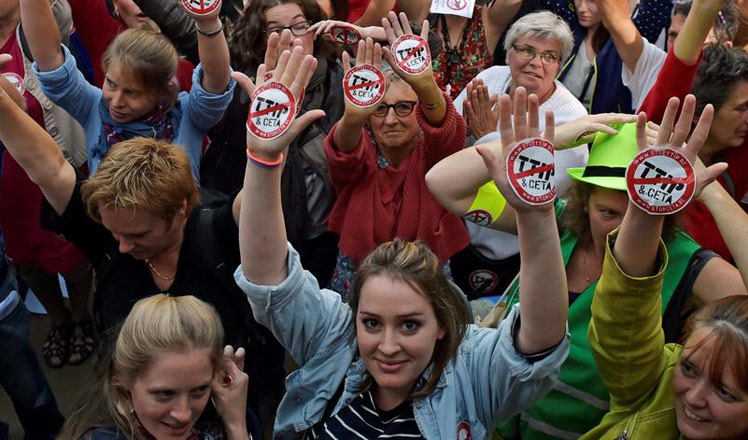US misreads terrorism even 15 years after 9/11
Updated: 2016-09-23 08:49
By Shen Dingli(China Daily)
|
||||||||
 |
|
Children peer into the south reflecting pool at the National September 11 Memorial and Museum in Manhattan, New York, US, September 1, 2016. [Photo/Agencies] |
The United States has not suffered any major terrorist attacks in the 15 years following the Sept 11, 2001, attacks. But that does not mean it has been free of terrorist attacks or threats; on the contrary, they are on the rise given the emergence of "lone wolf" attackers.
The past few years have seen terrorists' attempt to target Times Square in New York City, two explosions rocking Boston on the day of the city's annual marathon and, more recently, New York and New Jersey caught in the grip of panic after three bombings or bombing attempts.
The US is awkward with the fact that apart from those radical Muslims who have launched attacks in America, some of the attackers were radicalized after becoming naturalized US citizens. This shows former president George W. Bush's anti-terrorism narrative has not worked well. The US' unjustified invasion of Iraq might have turned more Muslims into radicals, and its equally baffling, hurried withdrawal of combat troops from the fractured country has created an even fertile soil that breeds terrorists.
Nevertheless, the US has been relatively safe from terrorists because of its security strategy reform, which includes the streamlining of various security agencies and creation of some new agencies to deal with emerging threats. In particular, the establishment of the Department of Homeland Security in 2003 has made the US more secure. It has also implemented new security laws, appointed a director of national intelligence to coordinate with other agencies, and significantly increased its budget to combat terrorism.
But the results of Washington's "war on terror" have been unbalanced. While the US has become more secure, the rest of the world is suffering the consequences of rising terrorism. Europe has experienced a number of terrorist attacks in the past years, with Paris and Brussels bearing the brunt.
The US invasion of Iraq in response to 9/11 was a complete mistake. By toppling the Saddam Hussein government in Iraq, causing the loss of hundreds of thousands of lives and unnecessarily (and covertly) meddling in Syria's affairs, the US paved the way for the emergence of the Islamic State group that has unleashed a reign of terror in Iraq and Syria. The US invasion of Iraq, the incessant sectarian violence that followed and the Syrian civil war have turned millions of people into refugees. And the refugee crisis has made the fight against terrorism more complicated and difficult.
Although these developments should prompt the US to review its policies to combat terrorism, this is unlikely to happen because going by the presidential campaign neither candidate seems interested in doing so. Republican presidential candidate Donald Trump's promise to build a new "Great Wall" may prevent illegal immigrants, including radical Muslims, from entering the US, but it cannot stop Americans within the confines of the so-called wall from becoming radicalized.
That the US should learn to distinguish terrorists from innocent people, rather than condemning all Muslims as terrorists goes without saying. More important, the US has the responsibility to create conditions that not only prevent people from becoming terrorists, but also compel terrorists to see reason and transform themselves. Though the task is very difficult, it is not impossible. As a first step, Washington should apologize for killing so many innocent Iraqis and others in the name of "war on terror", pay adequate compensation to the bereaved and devastated families, and hold all those responsible for creating such a humanitarian disaster accountable.
Since killing innocent people will create more terrorists, the US has to find the real reasons behind the challenges posed by terrorism to secure a workable solution.
The author is a professor at and associate dean of the Institute of International Studies, Fudan University.
- US fighter jet crashes off coast of Okinawa, Japan: DM
- State of emergency declared in US city Charlotte amid violent protests
- Clinton to highlight foreign policy experience to woo voters
- UN chief calls for support for political solution to Syrian conflict
- Brazil to begin Zika vaccine trials in humans
- Greek govt vows to improve refugee situation on island after fire

 8 things you may not know about Autumn Equinox
8 things you may not know about Autumn Equinox
 Italian sets new record with Ferrari on 'miracle road'
Italian sets new record with Ferrari on 'miracle road'
 Students compete for flight attendant jobs in Sichuan
Students compete for flight attendant jobs in Sichuan
 1st Sushi restaurant opens in DPRK
1st Sushi restaurant opens in DPRK
 Top 14 Chinese women in Fortune's ranking
Top 14 Chinese women in Fortune's ranking
 Hangzhou airport offers beds to tired travelers
Hangzhou airport offers beds to tired travelers
 Protesters march against EU trade deals with US
Protesters march against EU trade deals with US
 In photos: Chinese harvest in full swing
In photos: Chinese harvest in full swing
Most Viewed
Editor's Picks

|

|

|

|

|

|
Today's Top News
Trump outlines anti-terror plan, proposing extreme vetting for immigrants
Phelps puts spotlight on cupping
US launches airstrikes against IS targets in Libya's Sirte
Ministry slams US-Korean THAAD deployment
Two police officers shot at protest in Dallas
Abe's blame game reveals his policies failing to get results
Ending wildlife trafficking must be policy priority in Asia
Effects of supply-side reform take time to be seen
US Weekly

|

|









